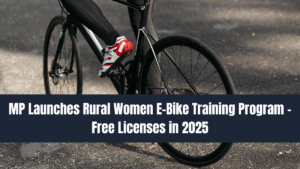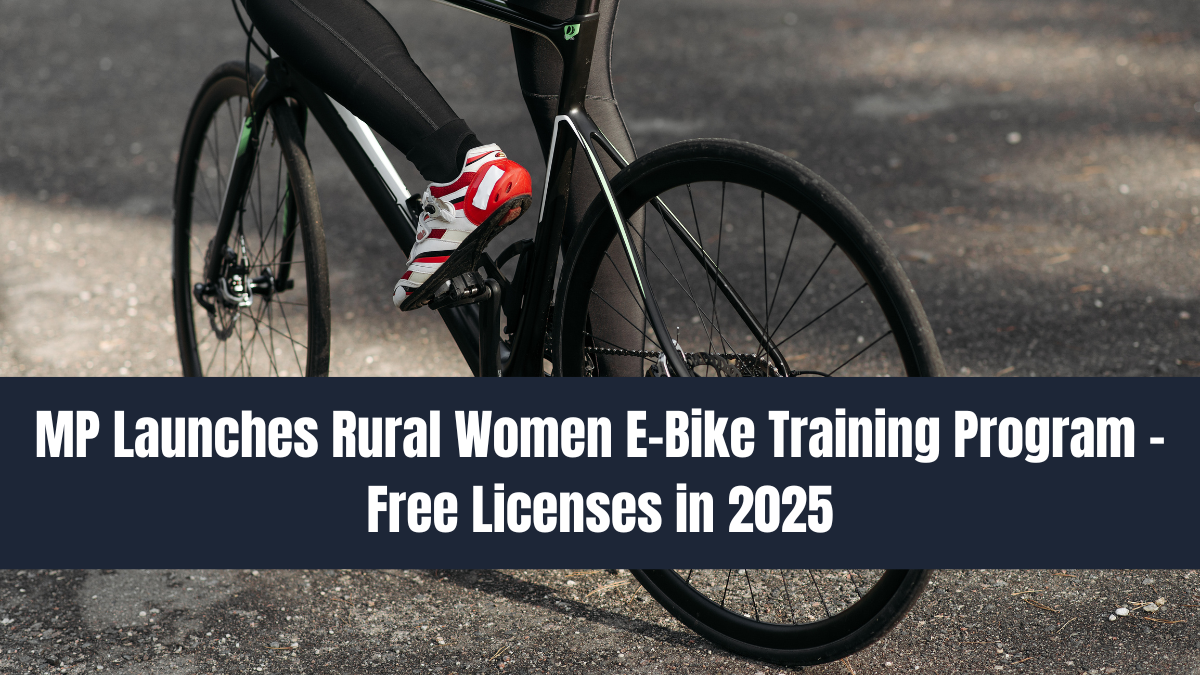The year 2025 marks a major milestone in Madhya Pradesh’s efforts to empower rural women through mobility and sustainable technology. The state government has announced the launch of the Rural Women E-Bike Training Program, a visionary initiative that provides free e-bike driving lessons and licenses to women across villages and small towns.
This program is not only about teaching women how to ride—it is about transforming lives by granting freedom, confidence, and access to new opportunities. With the added benefit of promoting eco-friendly vehicles, the scheme merges women’s empowerment with sustainability.

Bridging the Mobility Gap
For many women in rural India, mobility remains a challenge. Dependence on family members for travel, limited access to public transport, and social restrictions often hold them back from pursuing jobs, education, or entrepreneurship. The Rural Women E-Bike Training 2025 directly addresses these issues by making women independent drivers.
By offering free e-bike training sessions, the government ensures that cost is not a barrier. Women from farming families, self-help groups, and rural cooperatives are being encouraged to sign up. Once trained, they also receive driving licenses at no cost, making the process smoother and more accessible.
Why E-Bikes?
The focus on electric bikes (e-bikes) is intentional. E-bikes are eco-friendly, cost-effective, and easier to maintain compared to fuel-based two-wheelers. They produce zero emissions, aligning with India’s broader push toward sustainable transport.
For rural women, e-bikes have several advantages:
-
Affordability: Lower operating costs compared to petrol vehicles.
-
Ease of Use: Lightweight and simpler to handle, especially for beginners.
-
Eco-Friendly: Reduced carbon footprint contributes to cleaner villages.
-
Accessibility: Can be used for both personal and small business needs.
By introducing women to e-bikes, the government is creating a generation of environmentally conscious drivers while solving mobility issues.
Training Centers Across Villages
The program has established training hubs in rural clusters, often in partnership with local schools, NGOs, and women’s cooperatives. Certified trainers, many of whom are women themselves, guide participants through both practical riding lessons and basic road safety education.
Each participant undergoes:
-
Introduction to e-bikes – understanding controls, charging, and maintenance.
-
Basic riding practice – balance, acceleration, and braking techniques.
-
Traffic rules and road safety – including awareness of rural and highway conditions.
-
License test preparation – ensuring every woman leaves with a valid driving license.
The sessions are structured to be inclusive, allowing women of all ages—students, mothers, and even elderly participants—to learn confidently.
Social Impact of the Program
The Rural Women E-Bike Training Program 2025 goes far beyond mobility. It creates a ripple effect in society:
-
Economic Empowerment: Women can now reach markets, workplaces, and customers independently.
-
Education Access: Young girls can travel safely to schools and colleges.
-
Healthcare Access: Families benefit when women can reach hospitals or clinics quickly.
-
Social Confidence: Mobility builds self-esteem, breaking gender barriers in rural areas.
By focusing on women, the program directly uplifts entire households, as empowered women are more likely to invest in family welfare and education.
Promoting Green Mobility in Rural India
The initiative also supports India’s larger vision of a green future. Rural areas are often left behind in the shift to clean energy, but by introducing e-bikes as a mainstream transport mode, MP is making villages part of the sustainability movement.
Charging infrastructure is being developed alongside the program, with solar-powered charging stations planned in select clusters. This ensures that rural women not only learn to ride but also have reliable facilities to keep their e-bikes running.
Government Partnerships and Support
The scheme is backed by partnerships with e-bike manufacturers, skill development councils, and women’s welfare departments. Local NGOs are playing a crucial role in mobilizing participants, while financial institutions are exploring micro-loans and subsidies for women who wish to buy their own e-bikes after training.
This multi-stakeholder approach ensures that the initiative is sustainable and impactful, rather than being a one-time campaign.
Looking Ahead
The Rural Women E-Bike Training Program is being seen as a model that could be replicated across India. If successful, it could inspire similar initiatives in other states, creating a nationwide movement for women’s mobility and clean transport.
The Madhya Pradesh government has already announced plans to expand training centers, increase the number of beneficiaries, and introduce advanced skill modules such as maintenance workshops and entrepreneurial training for women who want to use e-bikes for delivery services or mobile businesses.
Final Thoughts
The Rural Women E-Bike Training 2025 is more than a government program—it is a revolution on two wheels. By blending women’s empowerment with sustainable mobility, MP is creating a future where women can travel freely, dream bigger, and contribute more effectively to society.
With every woman who learns to ride and earns her license, the state takes a step closer to equality, progress, and green innovation.
FAQs
What is the Rural Women E-Bike Training Program 2025?
It is an initiative by the Madhya Pradesh government to provide free e-bike riding lessons and driving licenses to rural women.
Why are e-bikes chosen for this program?
E-bikes are eco-friendly, affordable, and easier to handle than fuel-based vehicles, making them ideal for first-time riders in rural areas.
Who can participate in the training?
Women from rural areas, including students, self-help group members, and homemakers, can enroll for the free training.
Do participants get a free license as well?
Yes, once training is completed, participants are issued valid driving licenses without any fees.
How does this program benefit rural women?
It provides independence, access to education, better healthcare mobility, and new opportunities for income generation.
Is charging infrastructure available in villages?
Yes, solar-powered charging stations are being developed alongside the program to ensure reliable access for e-bike users.
Will this program expand to other states?
If successful, the initiative may serve as a model for other Indian states looking to empower women and promote green mobility.
Click here to know more.
